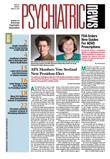Just because patients complain of chronic, nonspecific dizziness without an apparent physical cause doesn't mean that the problem lacks a diagnosis.
Intensive investigation can identify psychiatric or neurologic illnesses in nearly all these patients, according to psychiatrist Jeffrey Staab, M.D., M.S., and neurotologist Michael Ruckenstein, M.D., of the Balance Center at the University of Pennsylvania Health system in Philadelphia.
Staab and Ruckenstein drew from an initial group of about 2,400 patients who presented at their center with a variety of vertigo, dizziness, and imbalance complaints. Clinicians soon diagnosed about 75 percent of them.
“The key question is why all of them weren't diagnosed the first time around,” said Staab in an interview. “Often, doctors evaluate patients like this for inner-ear problems, treat them, and then if treatment fails, just assume it's 'psychogenic.'”
The patients didn't have the familiar spinning sensation that typifies vertigo caused by inner-ear problems, he said. Instead, chronic subjective dizziness (CSD) produces a feeling of swaying, often set off by motion cues in daily life, like being in crowds of people, around flashing light stimuli, or in heavy traffic. Symptoms could not be assigned to any inner-ear illness, medical condition, medication use, or radiographically imaged lesion. Many patients had poor concentration and difficulties in their family or work lives. They had experienced dizziness for an average of four years before entering the study.
“The classic concept of 'psychogenic' dizziness must be recognized as a misnomer that may cause errors of omission in medical evaluations of patients with chronic dizziness,” they wrote in the February Archives of Otolaryngology-Head and Neck Surgery.
The researchers prospectively studied the 345 patients referred to the Balance Center for whom no medical cause of nonvertiginous dizziness or subjective imbalance could be found initially. See
TableEach patient received three types of examinations, following the center's protocols. These included neurotologic histories and examinations, audiometric and balance function tests, and magnetic resonance imaging of the brain. Staab used a version of the Structured Clinical Interview for DSM-IV for psychiatric diagnosis. In addition, the patients were screened for other medical causes of dizziness such as head or neck trauma, visual disturbances, or cardiac dysrhythmias. Those screening positive for any condition were referred to specialists for further consultation.
Among the 115 men and 230 women in the study, nearly all (339) were ultimately diagnosed with psychiatric or neurologic conditions, including primary or secondary anxiety disorders, migraine, traumatic brain injury, or abnormal functioning of the autonomic nervous system (dysautonomia). Six were diagnosed with cardiac dysrhythmias, and all of them also had psychiatric disorders.
Of the 345 subjects in the study, nearly 60 percent had anxiety disorders associated with CSD, and 33 percent of the subjects with psychogenic dizziness had a primary psychiatric diagnosis. Three patients had conversion disorder or hypochondriasis. About 37 percent of the 345 patients, or 133, had some central nervous system disorder that caused their dizziness, including migraine, postconcussional syndrome, or dysautonomias.
Traumatic brain injury (TBI) was heavily overrepresented among patients with CSD—15 percent of the study subjects, compared with 0.6 percent of the general population.
“The pathological mechanisms that cause CSD in patients with TBI are not known but are probably not related to anxiety, given the low rates [5/52] of anxiety disorders found in the TBI group,” said the authors.
The rate of anxiety disorders among patients with migraine was four times higher than the population average. Epidemiological studies have found that 18 percent of Americans have an anxiety disorder, but 77 percent of the migraine patients in Staab and Ruckenstein's study had clinically significant anxiety.
Even the small number of cardiac dysrhythmias warrants attention, said Staab, an assistant professor in the departments of psychiatry, otorhinolaryngology-head and neck surgery, family medicine, and community health. Usually doctors think about irregular heartbeat when people complain about fainting, not dizziness.
“These patients follow an evolution of illness from true neurologic illness or panic attacks,” Staab told Psychiatric News.“ They become sensitized to motion cues—a kind of Pavlovian conditioning—and are left with this sensitivity, even after their physical problem is resolved. The idea that anxiety or migraine are players in this is not new, although now we can estimate prevalence a little better. What is new is how much concussion contributes to dizziness.”
About 1 percent of the U.S. population has CSD. Many patients just have given up. Some turn to complementary or alternative medicine or go on disability.
“Now we can tell patients that this is not a mystery,” said Staab. “We can explain just what causes their symptoms.”
Treatment choices remain undefined, said Staab. No big, randomized, controlled trials of treatment for chronic nonspecific dizziness have been conducted. Some small, open trials have researched treatment in three directions, however. Selective serotonin reuptake inhibitors have shown some utility in reducing anxiety and lessening dizzy symptoms. Cognitive-behavioral therapy has been tried in small numbers of patients, so far without conclusive data. A form of physical therapy, vestibular balance rehabilitation therapy, is also under investigation.
Psychiatrists should keep in mind that CSD lies in an area overlapping somatoform and anxiety disorders, said Staab. “Our challenge, as with any other somatoform disorder, is to better understand the medical differential diagnosis and understand the medical linkage among the symptoms.”
At the same time, physicians, whatever their specialty, should not think in either-or terms, said Staab. “It's not medical versus psychiatric.”
